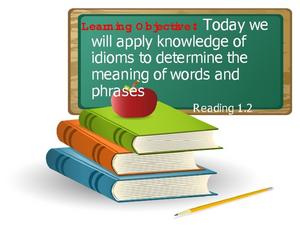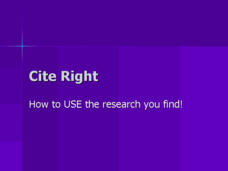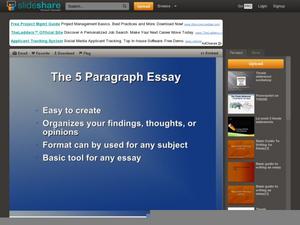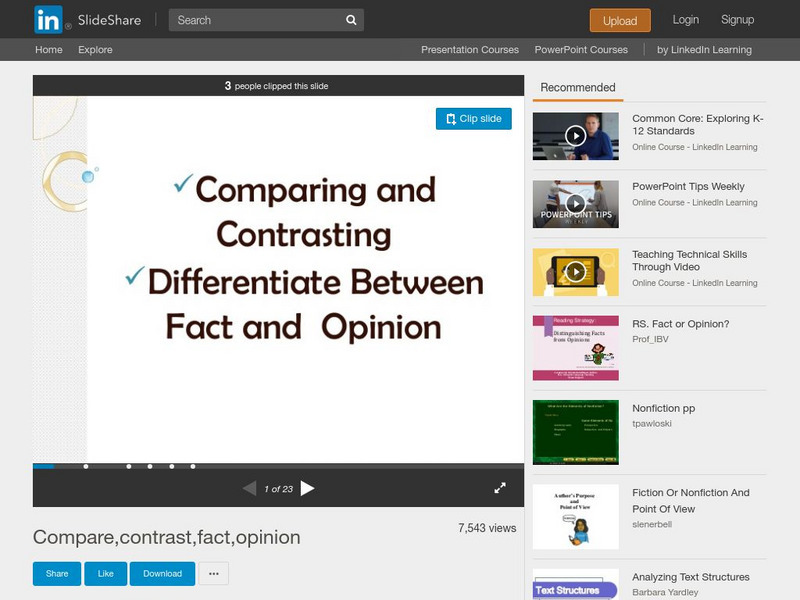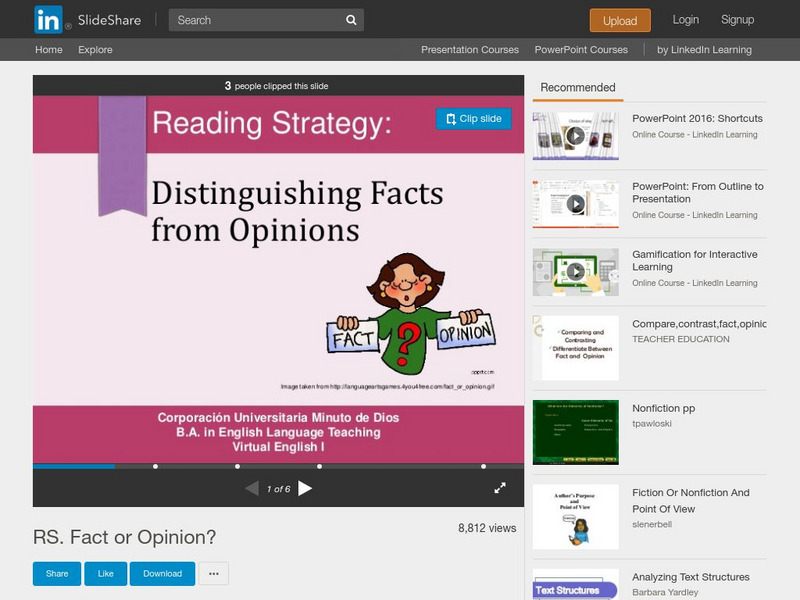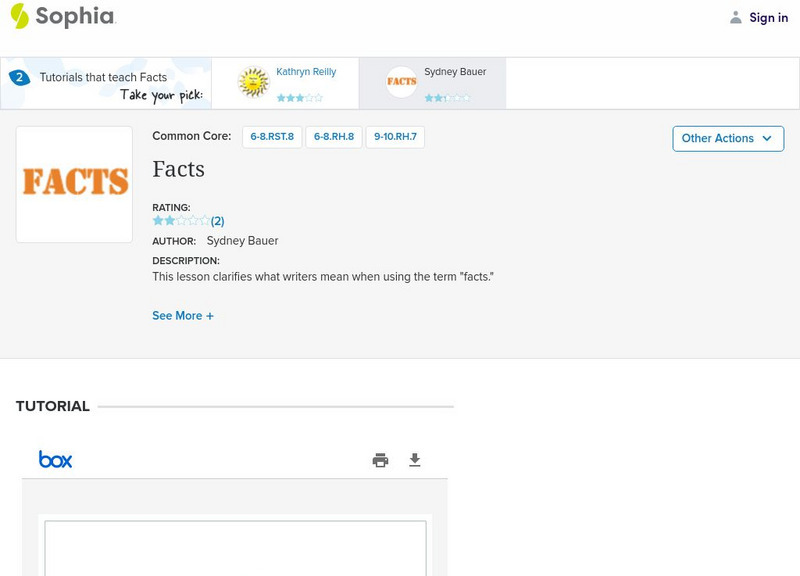Curated OER
Fact or Opinion?
Challenge your class to determine between facts or opinions in the following PowerPoint. Each section contains an advertisement with stated facts and opinions. This is a great game for learners to play individually or with partners.
Curated OER
Fact and Opinion
Facts and opinions are clearly defined in this organized PowerPoint. Following the definitions are a few examples that students must identify as facts or opinions. Tip: After viewing this presentation, ask students to share some of their...
Curated OER
Fact of Opinion?
A fact is a true statement and an opinion is what someone thinks, that's what your students will learn when they view this presentation. This resource provides definitions and examples of what facts and opinions are, then tests students...
Curated OER
Fact or Opinion
Have your class differentiate between fact and opinion using this presentation. Learners read a series of statements and identify whether the example is fact or opinion. This is a terrific and motivating way to explore this topic.
Curated OER
Discussing Non-Fiction Texts
Discuss non-fiction texts and fact and opinion. Learners discuss the features of non-fiction text, identify how to distinguish fact from opinion, and list ways to display information, including graphs, charts, and diagrams. While this is...
Curated OER
Newspapers
Here is an engaging and thought-provoking presentation on newspapers. Learners identify different types of text, study layouts, look at common features, and differentiate between fact and opinion in newspapers. Photos are included, and a...
Curated OER
Recognizing Bias
This PowerPoint outlines methods for recognizing bias in various forms of media. The presentation defines loaded words, stereotypes, and one-sided arguments as types of bias and also highlights the characteristics of facts and...
Education Bureau of Hong Kong
Fundamentals of Critical Thinking
Analyzing arguments is key to critical thinking. Colorful slides teach viewers how to recognize the structure of an argument, the claims, and the validity of the evidence used to support an argument. Then, provided scenarios permit...
Curated OER
Chalkboard Challenge: Literary Terms
This interactive PowerPoint simulates a "Jeopardy" game that addresses figurative language, cause and effect, and other literary terms. Players can chose which category and amount they would like to play on the Game Board.
Curated OER
Thesis Statements
At 32 slides, one would think this presentation on thesis statements is a bit too long, but it is the most important component of a well-written essay! Help your developing writers craft concise, interesting theses with this PowerPoint....
Chandler Unified School District
Satire: The Art of Indirect Persuasion
A free press is entitled to its opinions. While the news pages report the facts of events, editorial pages feature writers' and cartoonists' opinions about events to either directly or indirectly persuade. Introduce viewers to the art of...
Curated OER
Knowledge of Idioms
What is an idiom, and why is it necessary that we know and understand them? This brief PowerPoint helps answer these questions by looking at examples and offering a strategy for reading new text that might contain an idiom. The final...
Curated OER
Studying Idioms and Word Meaning
Idioms are really confusing, but learning them will help your readers deepen their understanding of a variety of texts. This 11-slide presentation offers several examples (like "break a leg" and "mind your manners") to help readers use...
Curated OER
Cite Right
What do you need to cite, and how can you avoid plagiarizing? This presentation is aimed at beginning writers, and it details some of the ways people plagiarize (even accidentally) and what sort of information needs to be cited. The...
Curated OER
The 5 Paragraph Essay
The value in this PowerPoint about the five-paragraph expository essay comes from the clear explanations and specific examples provided to illustrate each aspect; however, a complete, model essay is not included. Beware the typos!
Sophia Learning
Sophia: Fact vs. Opinion
Learn the difference between fact and opinion as it relates to scientific thinking.
Tom Richey
Slide Share: Comparing and Contrasting: Differentiating Between Fact and Opinion
This downloadable slideshow focuses on comparing and contrasting, and distinguishing between fact and opinion. It provides definitions and examples of each.
Sophia Learning
Sophia: Facts
This slideshow lesson focuses on facts; they are true, verifiable, and identical across sources. General facts, commonly accepted, do not need citations; specific facts: statistics, expert testimony, and anecdote do require citation.
Tom Richey
Slide Share: Facts and Opinions
This slideshow focuses on facts and opinions; it provides definitions, examples, and articles for practice.
Other
Prezi: Fact and Opinion
Resource exams how one can tell the difference between fact and opinion.
Tom Richey
Slide Share: Fact and Opinion
A slide show with sixteen slides with definitions, examples, and practice activities to use while learning about the difference between fact and opinion.
Sophia Learning
Sophia: Facts
This lesson clarifies what writers mean when using the term "facts." This tutorial lesson shares a short slideshow with the lesson's content.
Sophia Learning
Sophia: Supporting Details Explained
This slideshow focuses on supporting details; it discusses their purpose, the audience, and the point to be made. It lists the five most common types of supporting details: facts, statistics, opinions, examples, and personal observations...
Other popular searches
- Fact Opinion Lesson Plans
- Fact and Opinion Passages
- Fact Opinion Worksheet
- Fact and Opinion Lessons
- Teaching Fact vs. Opinion
- Fact and Opinion Worksheets
- Teaching Fact and Opinion
- Fact and Opinion Games
- Reading Fact and Opinion
- Fact and Opinion Keywords
- Identifying Fact or Opinion
- Fact Opinion Quiz











